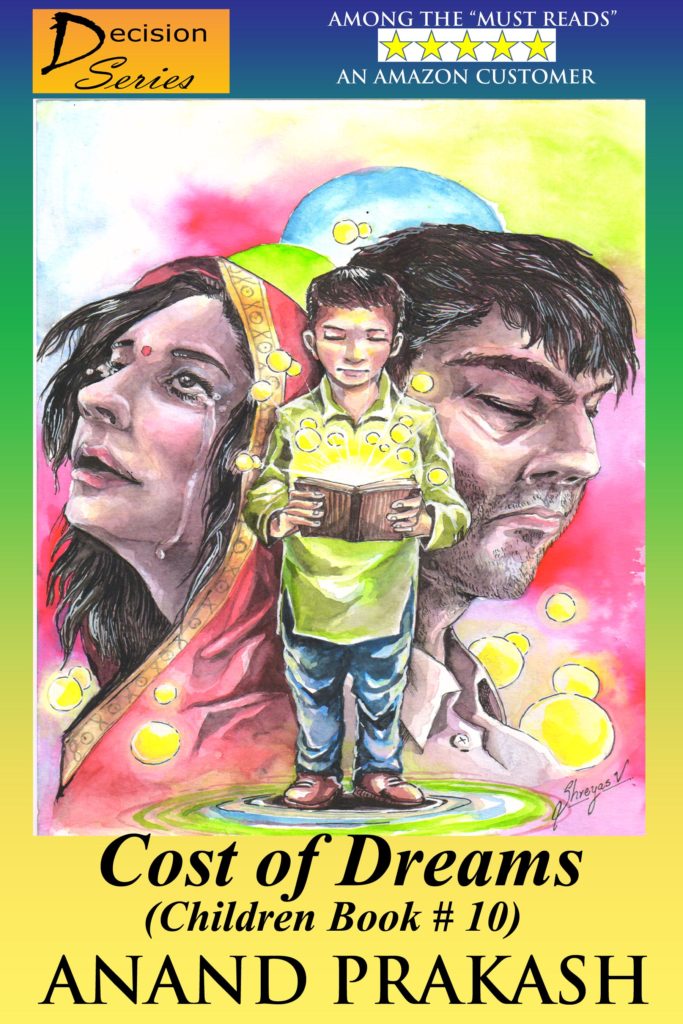Children’s Book: Cost of Dreams

Our decisions define us and our life is full of them.
In this short story, Lata goes to Manav Coaching Institute with her husband, Ramesh. Considering their monetary condition, she has to decide whether or not their hardworking son, Bannu, will be able to take AIPMT (All India Pre-Medical Test) coaching at No.1 Institute in the city.
Customer’s review for Cost of Dreams
Amazon.in
Amazon.com
In his newest publication, the author invites the readers to revisit the family from his last story and it’s a journey well worth taking. With accented ease, the author portrays the day-to-day meanderings of an Indian couple who has to decide precipitously before venturing into any investment, small or otherwise.
In this short story it is the credit of the author that he has touched upon multiple facades of life; one of them being emotions; and one emotion in particular: compromise! Lata, the protagonist of the story compromises her younger children happiness for her eldest’s studies. Her husband, Ramesh accompanies her to a city-based coaching center even though he remains skeptic of the outcome. Bannu the eldest child is mature enough to understand that he is weak in Botany but compromises on tuitions and decides upon buying second hand books. The second aspect of an Indian’s daily life the book touches is: coaching centers and to be honest, their advertisements. We have all seen these advertisements one time or the other, misshapen photos of youth looking like the victims of Hiroshima, topped with a congratulatory remark and bottom lined by the coaching centers name in bold. While most of us can laugh at such caricaturist attempt at advertising, for certain people of the non-privileged class, they incite hope, which brings us to the last and most important aspect of the story: dreams. The tale begins with a dream. It ends with bitter realization. And yet all is not lost. Lata’s dream transcends reality in the hope of a better future and the story turns a full karmic circle here. The author sums it up nicely and quite poetically in the words of a minor character “Everyone has the right to dream”!
To conclude: the “decision” series by the author is something that decidedly should not be missed!
In this short story it is the credit of the author that he has touched upon multiple facades of life; one of them being emotions; and one emotion in particular: compromise! Lata, the protagonist of the story compromises her younger children happiness for her eldest’s studies. Her husband, Ramesh accompanies her to a city-based coaching center even though he remains skeptic of the outcome. Bannu the eldest child is mature enough to understand that he is weak in Botany but compromises on tuitions and decides upon buying second hand books. The second aspect of an Indian’s daily life the book touches is: coaching centers and to be honest, their advertisements. We have all seen these advertisements one time or the other, misshapen photos of youth looking like the victims of Hiroshima, topped with a congratulatory remark and bottom lined by the coaching centers name in bold. While most of us can laugh at such caricaturist attempt at advertising, for certain people of the non-privileged class, they incite hope, which brings us to the last and most important aspect of the story: dreams. The tale begins with a dream. It ends with bitter realization. And yet all is not lost. Lata’s dream transcends reality in the hope of a better future and the story turns a full karmic circle here. The author sums it up nicely and quite poetically in the words of a minor character “Everyone has the right to dream”!
To conclude: the “decision” series by the author is something that decidedly should not be missed!
(Visited 252 times, 1 visits today)

